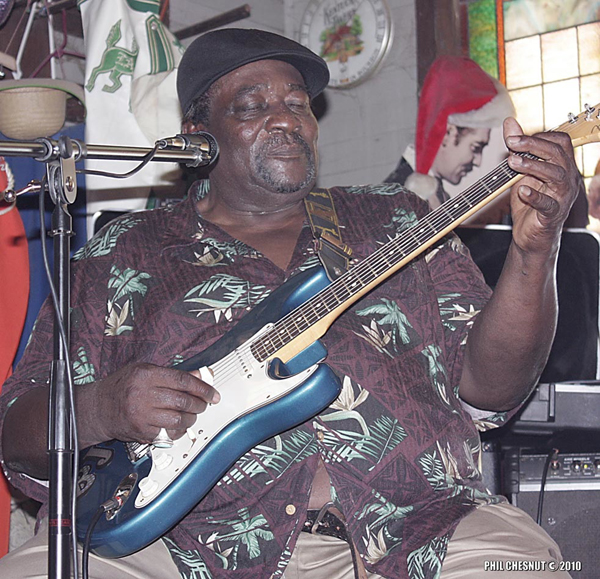MEMPHIS – Despite conflicting reports over the weekend that Delta blues musician Big Jack Johnson had died, sources close to his family confirmed that Johnson, affectionately known as the “Oil Man” died Monday morning, March 14, in Memphis from an undisclosed and lengthy illness.
According to the Pittsburgh Post Gazette, Johnson was one of the last of the deep-blues musicians out of the Clarksdale, Mississippi area, and he’s probably best known for being a part of the Jelly Roll Kings, a Mississippi trio consisting of Johnson, Sam Carr and Frank Frost.
Johnson also had a local reputation as a tough, hard-working singer and guitarist in the best of the deep blues tradition, who didn’t tour much, outside of Clarksdale, until the mid-’90s.
Johnson, who played bass and blues mandolin, was nicknamed the “Oil Man” because of his early years employed as a truck driver for Shell Oil.
Johnson was also the sole survivor of the major blues artists featured in the 1992 film, “Deep Blues,” based on a book by Robert Palmer.
Born on July 30, 1940 in Lambert, Miss., Johnson was one of the most popular and influential of the contemporary Delta Blues musicians active today.
Johnson often said that his first musical influence was his father, a country and blues musician, who persuaded his son to play the guitar. Very soon, Johnson had quickly mastered the finer points of the blues by sitting in with his father’s band while they performed throughout the area while Johnson was still a teenager.
Influenced by not only the blues music all around him, but also by the sounds of the white Country artists emanating out of the Grand Ole Opry, Johnson said in an earlier interview that his musical styling came “straight out of the Mississippi juke joint.”
Peppering his music with the traditional blues of his fellow Mississippians and the unmistakable Chicago blues legends, Johnson also introduced elements of funk and soul into his music that he said “kept the dance floors packed.”
During his lengthy musical career, Johnson had a penchant for reworking vocal songs into instrumental launching points, while his vocal styling featured his strong Mississippi accent and tone complete with raw and honest emotion.
While performing with the Jelly Roll Kings, Johnson and the trio often played back up for Sonny Boy and Nighthawk during the 1950s and 60s, and Johnson recorded his first song in Memphis, for Sam Phillips’ label in 1962.
For the remainder of the 1960s and much of the 70s, the Jelly Roll Kings played their brand of rugged and ragged good-time Mississippi blues in the ramshackle juke joints across the Delta region and won a slow, but, hard earned reputation as “the” quintessential Mississippi blues band.
The trio’s first lp, recorded in 1979 for Earwig titled “Rockin’ The Juke Joint Down”, received a nomination for a Handy Award for “Best Traditional Blues Album” in 1980 and also marked the first time Johnson performed as a vocalist on a record as well.
Festival appearances in Chicago and the Poconos as well as a couple of successful tours of the Netherlands brought the Jelly Roll Kings greater and international acclaim. But like many sucessful bands, after years of touring, personality disputes, quitting and reforming, the trio officially retired in 1987.
A final reunion recording “Off Yonder’s Wall” was recorded in 1997 and it received universal praise and dual Handy nominations in 1998 for “Comeback Album of the Year” and “Traditional-Blues Album of the Year” ending forever Johnson’s legacy with the Jelly Roll Kings.
In 1987, Johnson recorded his first solo project, simply titled, “The Oil Man.”
Since then, Johnson recorded at least nine CDs as a solo artist while appearing as a guest on numerous other sessions. Johnson said his last CD, “Katrina,” was his self-confessed musical “tribute to the land, people and spirit of Mississippi” to which he drew so much of his inspiration from.
As one of the most active touring international blues recording stars, Johnson will be remembered as a popular festival and club performer playing over 300 shows a year, and fans across the globe agree that whether he was crying the blues or jumping for joy, Big Jack Johnson ‘was’ the blues, and the blues shall remain his story.


Be the first to comment